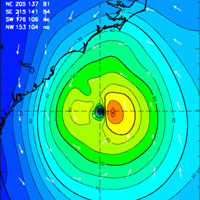|
|
|
|
|
|
 |
 |
 |
 |
 |
 |
 |
 |
 |
 |
 |
 |
 |
 |
|
|
|
|
Could Climate Change Cause the Next Cholera Pandemic?
Research co-authored by Dr. Sadie Ryan (UF) shows that, under a conservative future climate scenario, there is a predicted increase in areas with environmental conditions suitable for Vibrio cholerae, the bacterium that causes cholera. More >
|
Study: Summer Tropical Storms Don't Fix Drought Conditions
Popular opinion says that tropical storms and hurricanes that make landfall mitigate droughts in the southeastern United States. But that simply isn't true, according to Dr. Vasu Misra (FSU). More >
|
Threatened Corals Swap "Algae" Partners
A new study from the University of Miami shows why threatened Caribbean star corals sometimes swap partners to help them recover from bleaching events. The findings are important to understand the fate of coral reefs as ocean waters warm due to climate change. More >
|
|

|
New Information Changes Few Opinions on GMOs, Global WarmingFirst impressions are important. So much so that even armed with new information, many people won't change their minds about genetically modified foods and global warming, a new University of Florida study led by Brandon McFadden shows. "Possibly, the best indicator for whether a person will adopt scientific information is simply what a person believes before receiving the information," McFadden said. More >
|
High School Program Examines Sea Level Rise and Climate ChangeAs rising seas and South Florida's growing environmental concerns dominate conversations of local scientists, officials, business owners and journalists, students from the Marine and Science Technology High School at Florida International University have joined the Student Environmental Advocacy Corps to document their experiences as they focus on creating solutions for South Florida's changing environment. Miami Herald Article >
|
Better Ways to Quantify How Big and Bad A Hurricane Is
In an article in The Conversation, Drs. Vasu Misra and Mark Powell discuss a new method they've developed - called the Integrated Kinetic Energy (IKE) index - to project a hurricane's strength that takes into account the size of the tropical cyclone. More >
|
|
|
|
|
|
AgMIP Leaders Selected for American Society of Agronomy Presidential Award
Under the joint leadership and vision of co-principal investigator James W. Jones (UF/FCI) and colleagues, AgMIP has dramatically increased the coordination, transparency, and scientific rigor of agronomic modeling to address the pressing challenges of global change. More >
|
Congratulations to the 2015-16 UF FCI Faculty Fellows!
Please join us in congratulating Drs. Andrea Dutton and Clyde Fraisse for being selected as the 2015-16 University of Florida Florida Climate Institute Faculty Fellows! Both were selected from a distinguished candidate pool for their excellent interdisciplinary climate and extension programs that contribute to the goals of the FCI. More >
|
Weather Technology Added to FAMU Developmental Research School
WeatherSTEM has donated a weather station to Florida A&M University's Developmental Research School. The laboratory school last year received a $32,000 grant from the U.S. Forest Service's Southern Research Station to create an "outside" classroom where students could explore the wonders of science and technology. More >
|
|
Florida Events
Jul 12-17, 2015 | FAMU AG-TECH Century 21 Summer Enrichment Program for Teens | Tallahassee, FLJul 20-22, 2015 | Resilient Redesign II Workshop | Davie, FLNov 16-19, 2015 | National Working Waterfronts & Waterways Symposium | Tampa, FLDec 1-3, 2015 | Southeast Florida Regional Climate Leadership Summit | Key West, FLFeb 4-5 2016 | Sea-Level Rise Summit: Connected Futures from Alaska to Florida | Ft Lauderdale, FLFeb 16-17, 2016 | UF Water Institute Symposium | Gainesville, FLMore >
|
Sep 9-11, 2015 | US CLIVAR Virtual Workshop: Observing & Modeling Climate Variability in the Intra-Americas Seas & Impacts on the Continental Americas & the Caribbean | Online
Oct 11-14, 2015 | 2nd International Conference on Global Food Security | Ithaca, NY
Oct 15-16, 2015 | US CLIVAR Workshop: Translating Process Understanding to Improve Climate Models | Princeton, NJ
Nov 12-13, 2015 | Rising Seas Summit | Cambridge, MA
May 9-13, 2016 | US-Netherlands Connection (USNC) Professional Program | The Netherlands
|
|
Publications
FCI authors are in bold. Escobar, L. E., Ryan, S. J., Stewart-Ibarra, A. M., Finkelstein, J. L., King, C. A., Qiao, H., et al. (2015). A global map of suitability for coastal Vibrio cholerae under current and future climate conditions. Acta Tropica, 149, 202-211. McFaddon, B. R., & Lusk, J. L. (2015). Cognitive biases in the assimilation of scientific information on global warming and genetically modified food. Food Policy, 54, 35-43. Mei, C., Yazdani, R., Han, B., Mostafid, M. E., Chanton, J., VanderGheynst, J., et al. (2015). Performance of green waste biocovers for enhancing methane oxidation. Waste Management, 39, 205-215. Misra, V., & Bastola, S. (2015). Reconciling droughts and landfalling tropical cyclones in the Southeastern United States. Climate Dynamics, online release. Toth, L. T., Aronson, R. B., Cobb, K. M., Cheng, H., Edwards, R. L., Grothe, P. R., et al. (2015). Climatic and biotic thresholds of coral-reef shutdown. Nature Climate change, 5(4), 369-374. van Woesik, R., & Cacciapaglia, C. (2015). Refining reef-coral refugia. Glob Change Biol, online release.
|
About Us
The Florida Climate Institute (FCI) is a multi-disciplinary network of national and international research and public organizations, scientists, and individuals concerned with achieving a better understanding of climate variability and change.
|
|
|
|
 |
 |
 |
 |
 |
 |
 |
 |
 |
 |
 |
 |
 |
 |
|
|
|
|
|